Overview
Choosing the best carpet shops for your flooring business requires a strategic evaluation of your carpet needs. Begin by conducting thorough research on local shops, assessing the quality and variety of carpets available. It’s crucial to compare prices and services, read customer reviews, visit the shops in person, and engage with knowledgeable staff.
This article outlines a comprehensive approach that emphasizes understanding traffic levels, room functionality, and aesthetic preferences. By leveraging customer feedback and interacting with experienced personnel, you can make informed decisions that align with your budget and quality expectations. Remember, the right carpet shop can significantly impact your business's success.
Introduction
Choosing the right carpet shop is crucial for the success of a flooring business. However, many owners grapple with the complexities of a crowded market, which is saturated with varying quality and service levels. This guide offers essential insights into identifying the best retailers.
From understanding specific carpet needs to evaluating shop reputations, we aim to equip you with the knowledge necessary to navigate this landscape. With countless options at your disposal, how can you ensure that you select a shop that not only fulfills your aesthetic desires but also provides durability and value?
Define Your Carpet Needs
Begin by evaluating the purpose of the rug. Consider the following:
- Traffic Level: Assess whether the area experiences high traffic, such as hallways and entryways, or low traffic, like bedrooms. High-traffic areas demand , which can endure wear and tear while retaining their appearance. For instance, nylon floor coverings are renowned for their durability and ease of maintenance, making them ideal for bustling homes. Industry standards recommend professional cleaning every 6 to 12 months to uphold the warranty and appearance of the flooring.
- Room Functionality: Analyze the intended use of the space. Carpets in living rooms or offices require a harmonious blend of comfort and durability, while commercial spaces may emphasize stain resistance and maintenance ease. For example, Berber rugs, characterized by their looped design, offer durability and stain resistance, making them suitable for high-traffic home environments. A case study on 'Best Flooring Choices for High-Traffic Residential Areas' underscores that Berber styles are preferred for their capacity to withstand heavy use while maintaining a clean appearance.
- Aesthetic Preferences: Reflect on the color, pattern, and texture that will complement your existing decor. Subtle patterns can effectively disguise dirt and footprints, while darker shades excel at concealing stains. For instance, rugs in darker hues like navy or gray are particularly effective in hiding dirt. Compile a list of essentials and extras to streamline your search, ensuring that the selected flooring meets both functional and aesthetic criteria. Experts emphasize that choosing the right flooring fiber equips homeowners for durable surface solutions.
By grasping these essential factors, you can make informed decisions that enhance both the practicality and beauty of your spaces.
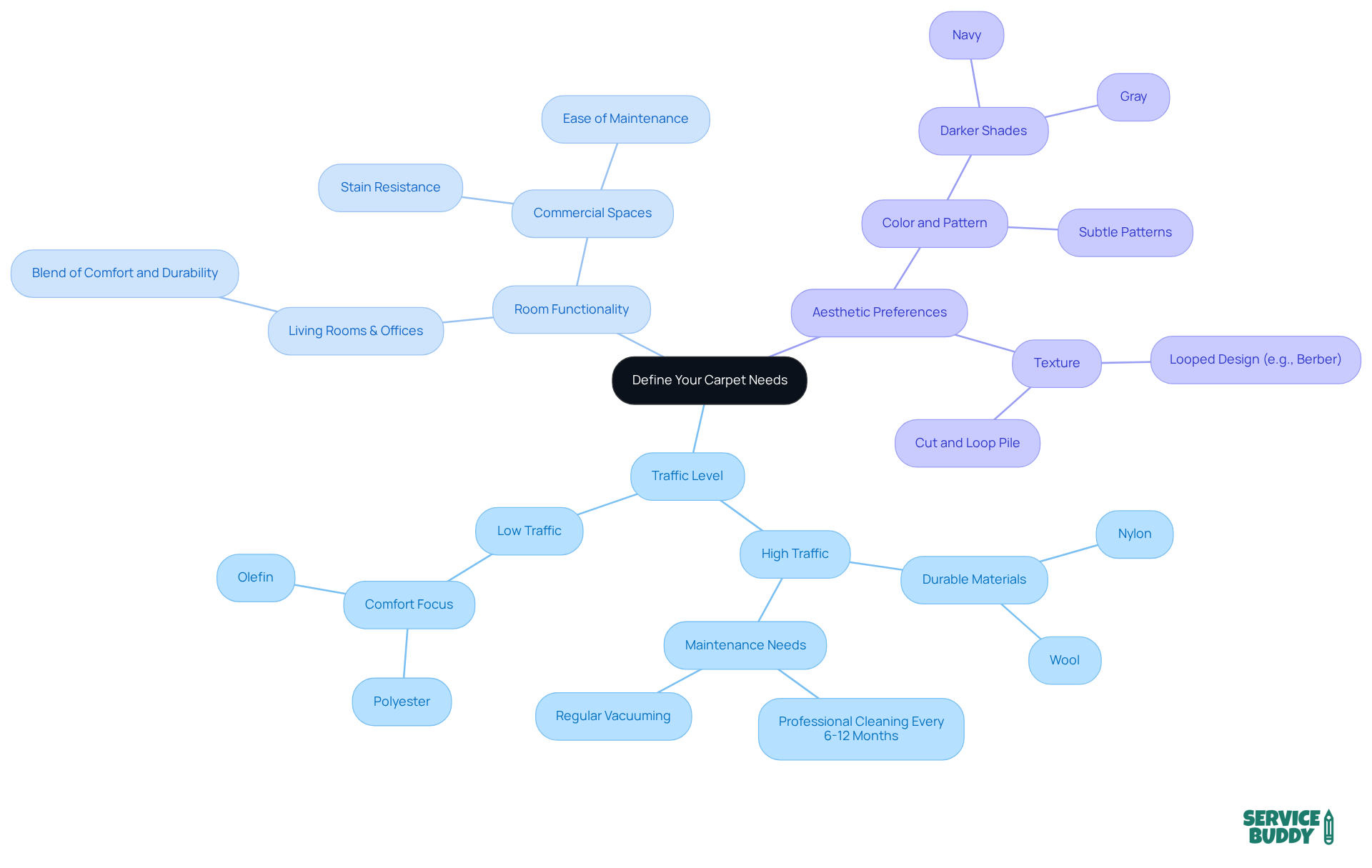
Research Local Carpet Shops
Begin your investigation by leveraging online platforms such as Yelp and Google Reviews, which are indispensable for gathering insights into customer experiences with various carpet shops. Carpet shops often accumulate numerous evaluations on these platforms, providing a rich source of information regarding service quality and product satisfaction. Engaging with these reviews enables you to pinpoint trustworthy carpet shops and avoid potential pitfalls. In fact, it is advisable to compare quotes from 2-3 sellers to secure the best price, as significant price discrepancies can arise even for identical products across different retailers.
Additionally, seek recommendations from friends, family, or colleagues who have recently purchased rugs; their insights can direct you toward reliable carpet shops. Their firsthand experiences frequently illuminate the strengths and weaknesses of specific retailers, steering you toward options that meet your requirements. As industry expert Kevin Brasler points out, "the differences among companies, even for the exact same thing, were thousands of dollars for just a moderate sized job."
Exploring the websites of nearby flooring stores is equally vital. These sites typically display their , allowing for convenient comparison of options. By synthesizing insights from online evaluations, personal recommendations, and direct information from carpet shops' websites, you can develop a comprehensive understanding of the flooring retailers available to you.
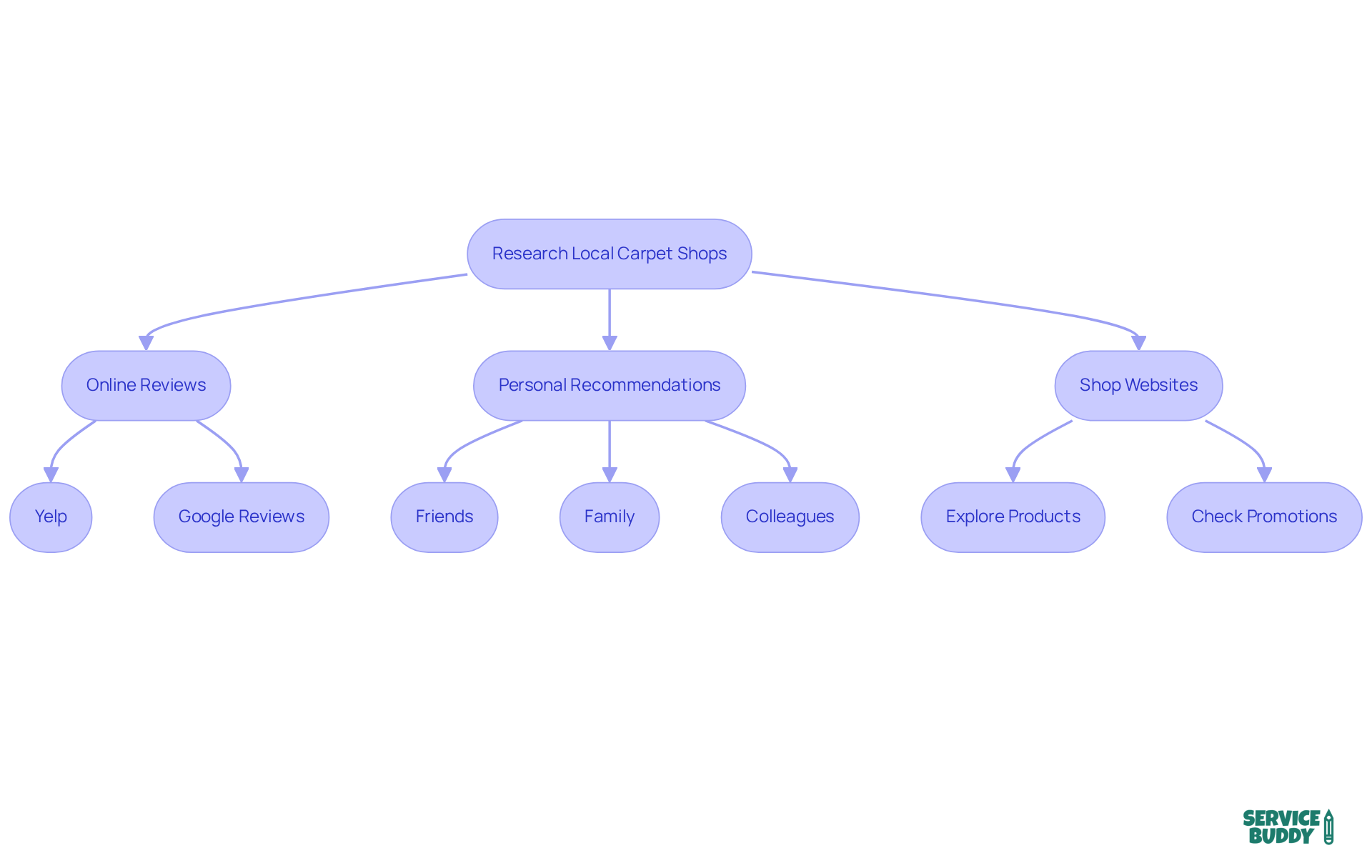
Assess Carpet Quality and Variety
When evaluating carpet quality, several key factors must be considered:
- Fiber Types: The most common fibers include nylon, polyester, and wool. Nylon is recognized for its strength and resilience, making it ideal for high-traffic areas. In contrast, polyester offers affordability and eco-friendliness. Wool, while more expensive, provides but requires more maintenance.
- Construction Methods: Carpets that are tightly woven or tufted typically demonstrate greater durability. For example, loop pile textiles, such as Berber, are designed to withstand heavy foot traffic due to their ability to flex and return to their original shape. A flooring density of 4,000 to 7,000 is recommended for commercial applications, ensuring durability in challenging environments. Notably, flooring in high-traffic zones requires a density of 5,000 or greater to maintain its durability.
A quality carpet shop should provide a diverse range of styles, colors, and textures to meet various aesthetic preferences. It is advisable to request samples to visualize how the flooring will complement your space. Popular styles include frieze, shag, and textured plush, each providing unique benefits in terms of comfort and appearance.
- Expert Opinions: Flooring specialists emphasize the importance of selecting rugs based on their construction techniques. For instance, rugs with a higher face weight, typically 32 ounces per square yard or more, are often more durable and resistant to wear. Consulting knowledgeable sales representatives in carpet shops can yield valuable insights into the best options for your specific needs. As noted by Carpet Express, "Investing in a durable flooring option ensures long-lasting performance and minimal upkeep."
By focusing on these aspects, you can make informed decisions that enhance both the aesthetic appeal and durability of your flooring choices.
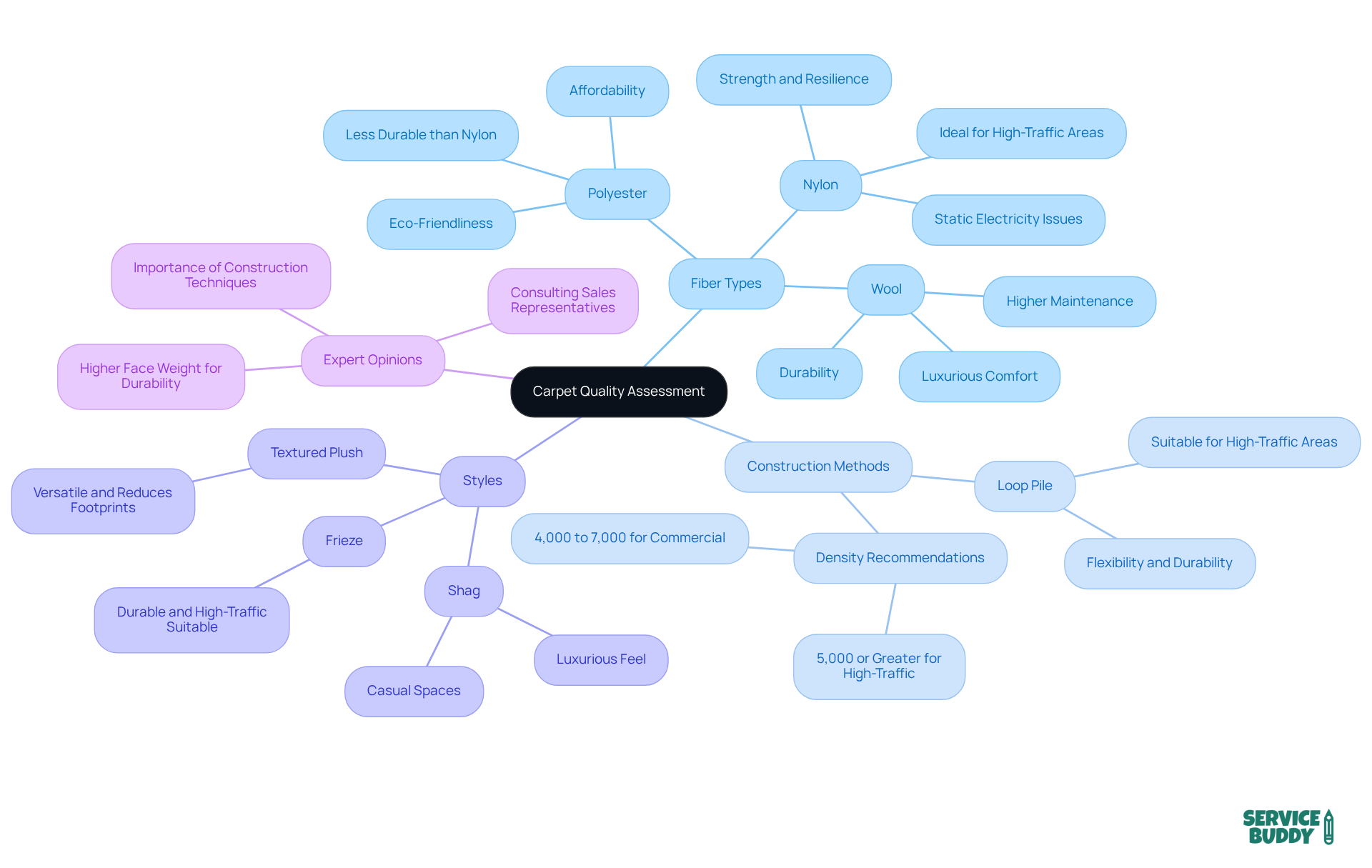
Compare Prices and Services
To effectively compare prices and services when selecting carpet shops, follow these essential steps:
- Request Detailed Quotes: Reach out to multiple carpet retailers to obtain comprehensive quotes. Ensure these quotes encompass not only the carpet expenses but also setup charges and any extra options provided, such as padding or removal of old carpet. This transparency is crucial for making .
- Evaluate Included Services: Assess what services are bundled with the quoted price. Seek services such as complimentary measurements, delivery, and warranty for setup. These factors can significantly impact the overall value of the deal.
- Be Aware of Promotions: Stay vigilant for seasonal sales or special discounts that can lead to substantial savings. Numerous flooring stores conduct promotions that may not be extensively publicized, so it is beneficial to ask directly. However, be cautious, as the cost of 'free' installation is often factored into the flooring price, which may mislead consumers.
- Consider Professional Insights: Flooring industry professionals emphasize the importance of detailed quotes. Kevin Brasler, executive editor at Checkbook.org, observes that costs for the same flooring can differ greatly, occasionally spanning from $1,800 to more than $6,000 for the same materials and labor. A well-structured quote not only clarifies costs but also outlines the scope of work, ensuring that all parties have aligned expectations.
Statistics on Extra Offerings: Research shows that numerous carpet shops provide a range of supplementary options, which can enhance the overall buying experience. For instance, services like stain-resistant treatments or extended warranties can add significant value to your investment. The typical expense for laying down flooring varies from $3 to $11 per square foot, emphasizing the significance of careful evaluations.
- Examples of Effective Quote Requests: When contacting retailers, be specific about your needs. For example, ask for detailed quotes that outline expenses for carpet, setup, and any additional items. This clarity can help identify potential savings and ensure you receive the best deal possible. Additionally, always obtain a written sales contract that details the price and inclusions before finalizing the deal.
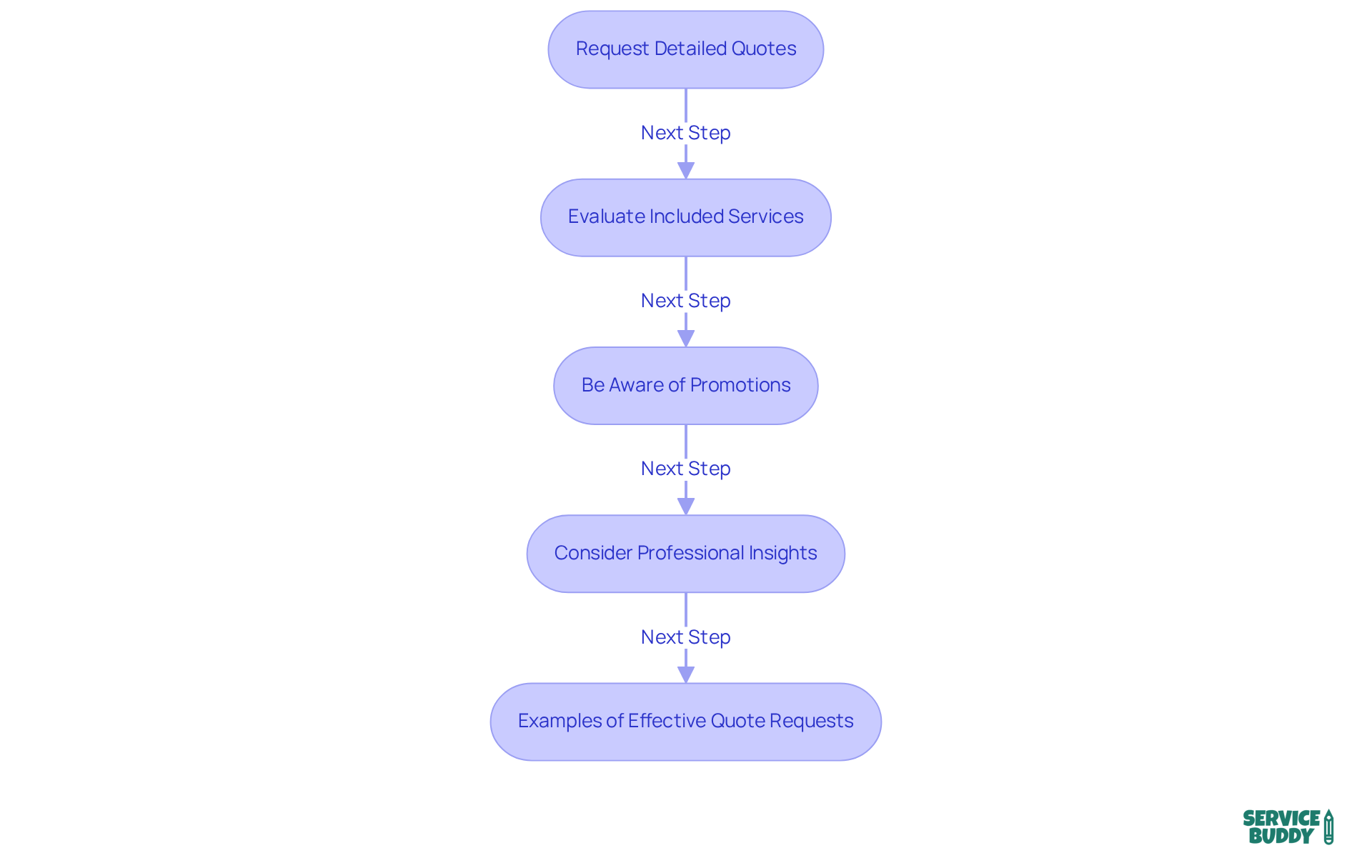
Read Reviews and Testimonials
When evaluating reviews, consider the following key aspects:
- Overall Ratings: Seek out shops that maintain consistently high ratings across various platforms. A strong average rating, ideally between 4.0 and 4.5 stars, can indicate a reliable choice, as businesses in this range often see an increase in annual revenue by up to 28%. Notably, the average star rating for retail and wholesale is 4.27 stars out of 5.0, further emphasizing the importance of high ratings.
- Specific Feedback: Delve into comments regarding product quality, customer service, and installation experiences. Reviews that highlight durability and performance, particularly for carpets like Mohawk's , can provide insights into how well products hold up in high-traffic areas. Additionally, reviews discussing value tend to be more critical than those focusing on other aspects, offering a nuanced understanding of customer feedback.
- Response to Complaints: Evaluate how the establishment addresses negative reviews. A proactive approach to resolving issues can reflect a commitment to customer satisfaction. Research shows that 67% of consumers are influenced by a company's response to reviews, which can significantly impact their future buying decisions. It's also important to note that 63.3% of consumers never hear back from the company after a review, highlighting the need for timely responses.
- Examples of High-Rated Stores: Look for establishments like Flooring Attic, acknowledged as a Top 10 Flooring Retailer in the United States, which highlights outstanding support and competitive pricing. Flooring Attic has been a trusted name in flooring since 1985, and their strategies often include prompt responses to customer inquiries and a focus on quality installation services, ensuring that products perform as expected.
- Average Response Time: Examine the average response duration of flooring retailers to customer grievances. Quick responses can enhance customer trust and loyalty, as 63.3% of consumers expect a reply within a week after leaving a review. Furthermore, 53.3% of consumers expect brands to respond to their reviews within a week, reinforcing the importance of quick communication.
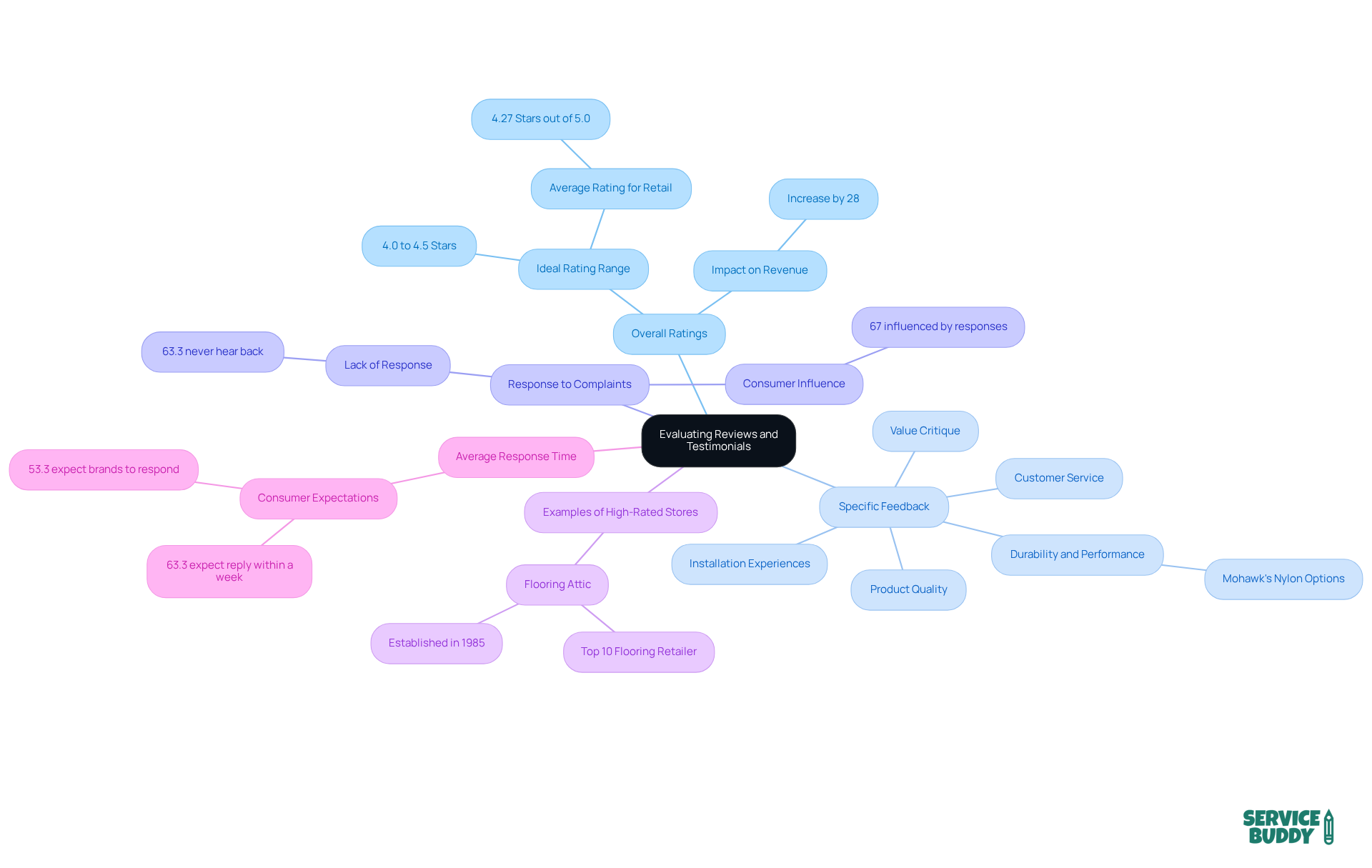
Visit Shops and Engage with Staff
When exploring carpet shops, seize the opportunity to thoroughly examine the fabrics. Observing the texture, color, and overall appearance in person is essential for making an informed decision. Engaging with the staff at carpet shops is equally important; ask them about the flooring's durability, maintenance requirements, and warranty options. Inquire about their installation process, as expert setup is vital for ensuring the longevity and aesthetic appeal of the flooring. Additionally, ask about any additional services they may offer, such as cleaning or underpadding options. Remember to request to assess color compatibility with your existing decor and how lighting affects the appearance. Taking notes during your visit can help you recall important details and impressions, simplifying the comparison of various stores later. Be vigilant about potential hidden fees or bait-and-switch tactics, and ensure you fully understand the pricing structure. Effective interactions with knowledgeable staff can significantly enhance your shopping experience, ensuring you discover the right products for your flooring business. On average, customers invest a considerable amount of time in flooring stores, so plan your visit accordingly.
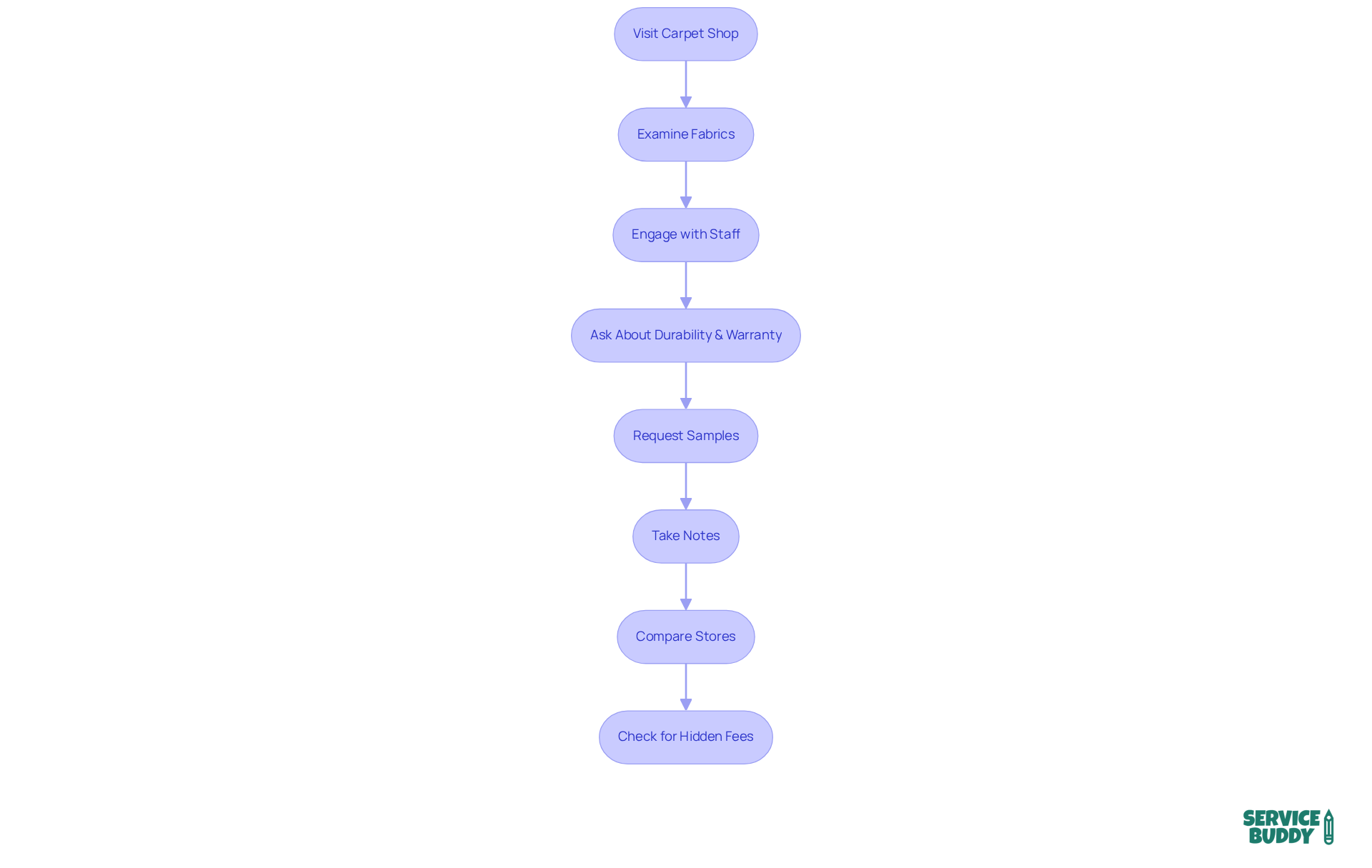
Make Your Final Decision
To finalize your decision:
- Review Your Notes: Reflect on the information gathered from your research, visits, and discussions with staff to ensure you have a comprehensive understanding of your options.
- Consider Your Budget: Align your choice with your financial plan, taking into account setup and maintenance expenses. For instance, the typical expense of floor covering setup varies from $3 to $11 per square foot, and additional costs for floor covering removal can increase by $2 to $3 per square foot. It is crucial to account for these costs to avoid unexpected financial strain.
- Budgeting for Maintenance: Remember that flooring requires ongoing upkeep, which can include stain-resistant treatments costing about $80 for 1,000 square feet. If the rug you select hasn’t undergone any stain-resistant treatment during the production phase, you can have it sprayed on after setup. Allocating funds for these treatments can prolong the lifespan of your flooring and enhance its appearance.
- Examples of Budget Considerations: If you're contemplating a 200-square-foot area, the total expense for flooring and installation could vary from $600 to $2,200, depending on the material and intricacy of the installation. For larger areas, costs can vary significantly; for example, 500 sq ft may range from $1,500 to $5,500, and 1,000 sq ft could range from $3,000 to $11,000. This emphasizes the significance of that aligns with both your aesthetic preferences and your budget.
Trust your instincts when choosing the carpet shops and flooring that resonate with you based on quality, service, and personal preferences. As noted, the best carpet for your home is the one that stands up to the amount of foot traffic you anticipate while also fitting your price range and your home’s aesthetics. Once you make your decision, proceed with the purchase and schedule installation, ensuring that all aspects of your budget are accounted for.
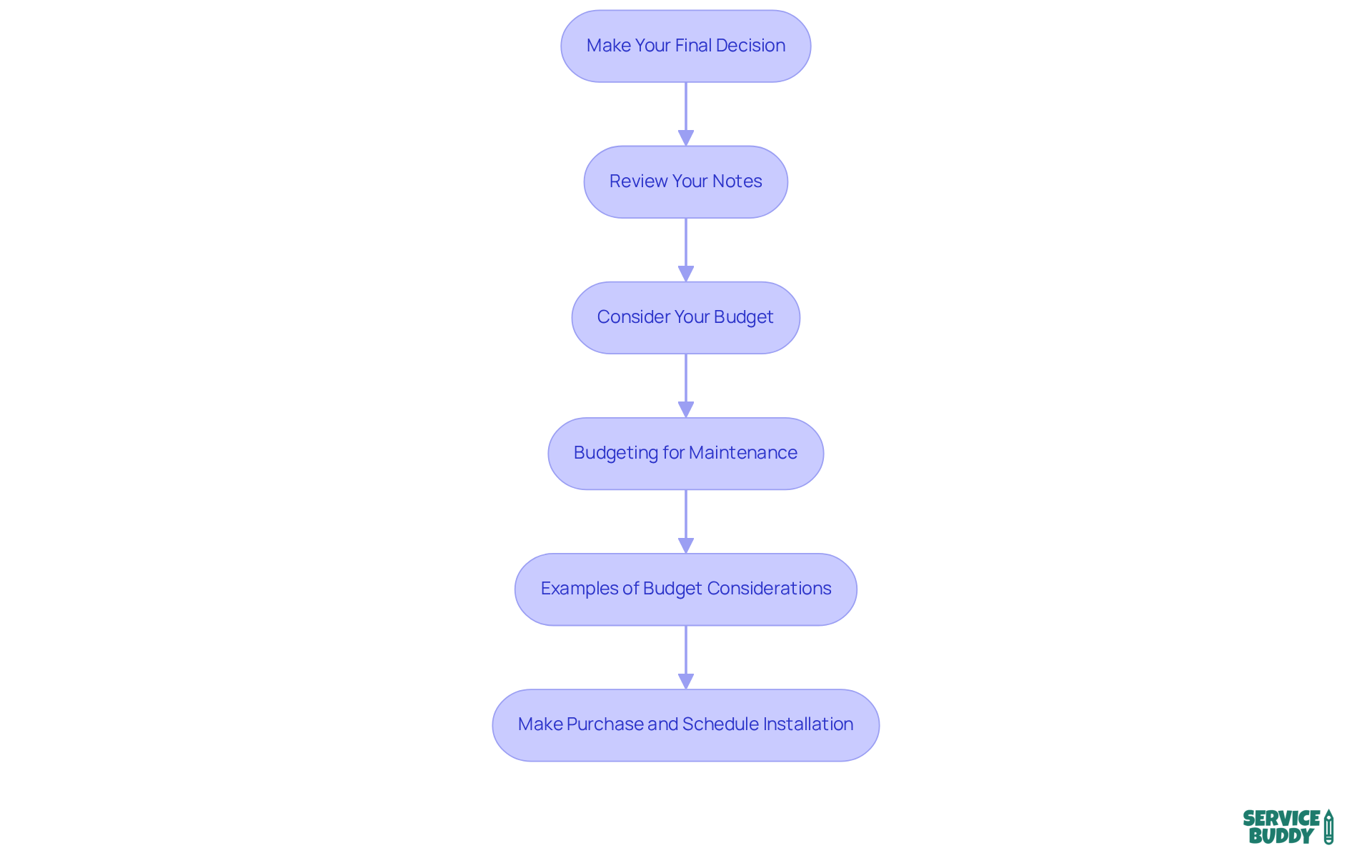
Conclusion
Choosing the right carpet shop is pivotal for ensuring that your flooring business meets both aesthetic and functional needs. By understanding your specific carpet requirements—considering factors such as traffic levels, room functionality, and aesthetic preferences—you can make informed decisions that enhance the beauty and practicality of your spaces.
Key considerations throughout the selection process include:
- Thorough research on local carpet shops
- Assessing product quality and variety
- Comparing prices and services
- Reading customer reviews
Engaging with knowledgeable staff during visits can further enrich your understanding, allowing you to ask pertinent questions and gain insights into the best flooring options available.
Ultimately, the goal is to find a carpet shop that aligns with your needs, budget, and style preferences. Investing time in this decision-making process will not only lead to a satisfying purchase but also ensure that your flooring remains durable and appealing for years to come. Take the necessary steps to explore your options, and trust that the right carpet shop will provide the quality and service that your flooring deserves.
Frequently Asked Questions
How do I determine my carpet needs?
Start by evaluating the purpose of the rug, considering factors such as traffic level, room functionality, and aesthetic preferences. High-traffic areas require durable materials like nylon or wool, while the intended use of the space affects the choice of comfort and maintenance ease. Aesthetic preferences involve selecting colors, patterns, and textures that complement your decor.
What materials are recommended for high-traffic areas?
For high-traffic areas, durable materials like nylon and wool are recommended. Nylon is particularly known for its durability and ease of maintenance, making it ideal for busy homes.
What should I consider regarding room functionality when choosing a carpet?
Analyze the intended use of the space. For example, carpets in living rooms or offices should balance comfort and durability, while commercial spaces may prioritize stain resistance and ease of maintenance.
How can I find reliable carpet shops?
Use online platforms like Yelp and Google Reviews to gather insights into customer experiences with various carpet shops. Additionally, seek recommendations from friends, family, or colleagues who have recently purchased rugs.
Why is it important to compare quotes from different carpet sellers?
Comparing quotes from 2-3 sellers is advisable because significant price discrepancies can occur for identical products across different retailers. This helps ensure you secure the best price.
What information can I find on carpet shops' websites?
Carpet shops' websites typically display their product offerings, services, and any special promotions, allowing for convenient comparison of options and better-informed decisions.
How can I enhance my search for the right carpet?
Compile a list of essential and extra features you desire in a carpet. This will streamline your search and ensure that the selected flooring meets both functional and aesthetic criteria.




